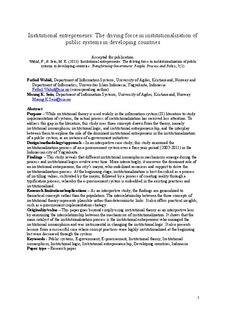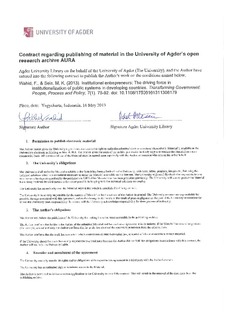| dc.contributor.author | Wahid, Fathul | |
| dc.contributor.author | Sein, Maung K. | |
| dc.date.accessioned | 2013-05-16T11:48:06Z | |
| dc.date.available | 2013-05-16T11:48:06Z | |
| dc.date.issued | 2013 | |
| dc.identifier.citation | Wahid, F., & Sein, M. K. (2013). Institutional entrepreneurs: The driving force in institutionalization of public systems in developing countries. Transforming Government: People, Process and Policy, 7(1), 76-92. doi: 10.1108/17506161311308179 | no_NO |
| dc.identifier.issn | 1750-6166 | |
| dc.identifier.uri | http://hdl.handle.net/11250/136324 | |
| dc.description | Author's version of an article in the journal: Transforming Government: People, Process and Policy. Also available from the publisher at: http://dx.doi.org/10.1108/17506161311308179 | no_NO |
| dc.description.abstract | Purpose: While institutional theory is used widely in the information system (IS) literature to study implementation of systems, the actual process of institutionalization has received less attention. The purpose of this paper is to address this gap in the literature by using three concepts drawn from the theory, namely, institutional isomorphism, institutional logic and institutional entrepreneurship, and the interplay between them to explore the role of the dominant institutional entrepreneur in the institutionalization of a public system, as an instance of e-government initiatives. Design/methodology/approach: In an interpretive case study, this study examined the institutionalization process of an e-procurement system over a four-year period (2007-2011) in the Indonesian city of Yogyakarta. Findings: This study reveals that different institutional isomorphism mechanisms emerge during the process and institutional logics evolve over time. More interestingly, it uncovers the dominant role of an institutional entrepreneur, the city's mayor, who mobilized resources and support to drive the institutionalization process. At the beginning stage, institutionalization is best described as a process of instilling values, cultivated by the mayor, followed by a process of creating reality through a typification process, whereby the e-procurement system is embedded in the existing practices and institutionalized. Research limitations/implications: As an interpretive study, the findings are generalized to theoretical concepts rather than the population. The interrelationship between the three concepts of institutional theory represents plausible rather than deterministic links. It also offers practical insights, such as e-procurement implementation strategy. Originality/value: This paper goes beyond simply using institutional theory as an interpretive lens by examining the interrelationship between the mechanisms of institutionalization. It shows that the main catalyst of the institutionalization process is the institutional entrepreneur who managed the institutional isomorphism and was instrumental in changing the institutional logic. It also presents lessons from a successful case where corrupt practices were highly institutionalized at the beginning but were decreased through the system. | no_NO |
| dc.language.iso | eng | no_NO |
| dc.publisher | Emerald | no_NO |
| dc.subject | public systems | no_NO |
| dc.subject | E-government | no_NO |
| dc.subject | E-procurement | no_NO |
| dc.subject | institutional theory | no_NO |
| dc.subject | institutional isomorphism | no_NO |
| dc.subject | institutional logic | no_NO |
| dc.subject | institutional entrepreneurship | no_NO |
| dc.subject | developing countries | no_NO |
| dc.subject | Indonesia | no_NO |
| dc.title | Institutional entrepreneurs: The driving force in institutionalization of public systems in developing countries | no_NO |
| dc.type | Journal article | no_NO |
| dc.type | Peer reviewed | no_NO |
| dc.subject.nsi | VDP::Social science: 200::Political science and organizational theory: 240 | no_NO |
| dc.source.pagenumber | 76-92 | no_NO |
| dc.source.volume | 7 | no_NO |
| dc.source.journal | Transforming Government: People, Process and Policy | no_NO |
| dc.source.issue | 1 | no_NO |
| dc.identifier.doi | 10.1108/17506161311308179 | |

